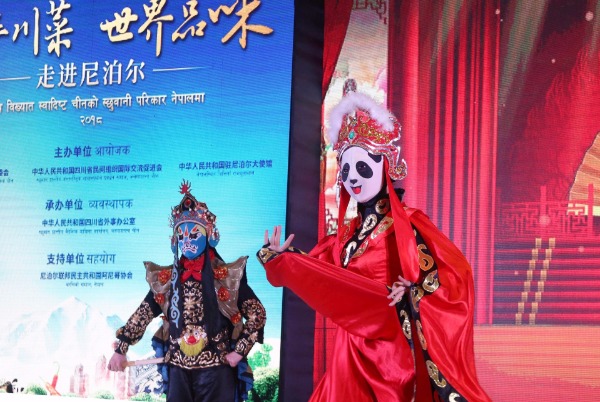US woman plays major role in promoting Chinese culture


Joe Sinicki would have mistaken Carrie Feyerabend for a Chinese performer, had he not watched her presentation of the Peking Opera classic, The Heavenly Maid Scatters Blossoms, at a recent show at the State University of New York in Buffalo.
"She did pretty well. If I didn't see her, I would have thought she was maybe a Chinese girl," says Sinicki, who is a fan of Peking Opera.
"It was cool. I liked it. It was very abstract. There's a lot of symbolism," says Sinicki, who was enthralled by Feyerabend's dance with shuixiu, literally meaning "water sleeves", one of the most skillful stunts in Peking Opera.
Shuixiu refers to the extra-long dancing sleeves attached to the cuffs of a costume, which are used to perform various movements. There are hundreds of gesticulations in shuixiu dancing such as quivering, throwing and wagging.
Feyerabend is an American artist from the Confucius Institute of Chinese Opera at Binghamton University who joined her Chinese counterparts in the show, Amazing Chinese Opera, which was held during the university's International Education Week in November, an annual initiative to celebrate and promote international education and exchange.
Founded in 2009, the institute is the first such place in the United States to offer Chinese opera lessons through cooperation with the National Academy of Chinese Theater Arts in Beijing, while supplying tools and support for teaching Chinese language and culture.
Regular shows
Brought up in Skaneateles, a small town in New York state, Feyerabend studied Peking Opera in Beijing and now serves as an assistant to the director of the Confucius Institute at BU and is the only US member of its eight-person troupe.
"I enjoy playing that role," says the 26-year-old, who's the Peking Opera performer, anchorwoman and artistic director of each show. "I like being behind the stage and helping people make sure that they have a good performance. I'm just so proud of the work that they do. It's fun to watch. Every single time they make it look effortless."
Apart from the onstage work, Feyerabend helps in designing the troupe's repertoire, including Peking Opera acts, Chinese folk songs and traditional music such as guzheng (Chinese zither) and dizi (flute). The troupe has staged nearly 100 performances in more than 30 US states since 2009.
In order to better entertain local audiences, Feyerabend and her colleagues look to develop a good mix of music and Peking Opera, and give variations of different scenes from opera plays while making an individual act no longer than 10 minutes.
Feyerabend has been working at the institute for more than three years. A large part of her job is preparation work to ensure that all is set for the troupe to perform across the country.





































